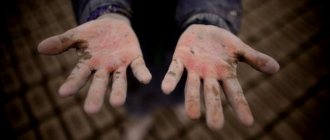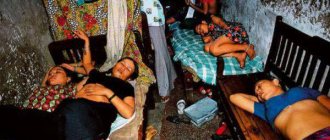Child labor was still mandatory in the Soviet Union. Minors were sent to collective farms, forced to work for the improvement of schools, etc. At that time, this was in no way considered as forced exploitation of child labor. This was considered a direct legislative duty.
Now, with the adoption of the Labor Code of the Russian Federation, as well as the basic law of the state - the Constitution of the Russian Federation, labor is considered completely voluntary, which is why the need arose to introduce responsibility for the exploitation of labor, including children.
What Russian legislation says about child exploitation
The fundamental instrument that governs the prohibition of forced labor of children is the Convention on the Rights of the Child . In the Russian Federation, the labor rights of minors are enshrined in the Labor Code of the Russian Federation.
According to Russian legislation, a citizen has full labor rights from the age of sixteen
It states that a citizen has full labor rights from the age of sixteen. Children can work at an earlier age. But for this it is necessary to have the consent of the parents and, in some cases, the guardianship authorities.
The exploitation of child labor is not regulated by a separate article of the Criminal Code of the Russian Federation. This omission is already being discussed in the State Duma and appropriate amendments will most likely be made soon. In the meantime, Article 127.2 of the Criminal Code of the Russian Federation is being considered as a possible prosecution.
Types of exploitation
The use of illegal child labor can be used in various areas. These include:
- The sphere of advertising.
- Trade.
- The sphere of provision of sexual services.
- Cleaning industry, etc.
Exploitation is always a forced phenomenon. Neither an adult nor a child can be involved in labor. We can highlight a separate article of the criminal code, which regulates illegal recruitment to labor - Article 127 of the Criminal Code of the Russian Federation (Use of slave labor).
Examples of child labor exploitation
In the past, the involvement of children in work was widespread - for example, in the 19th century, children, together with adults, from the age of 5 or 6 worked in factories and factories in Europe and America. However, today in most countries such activities are illegal. According to statistics, 152 million children aged 5-17 are involved in child labor - especially in agriculture, the service sector and manufacturing.
In civilized countries, the exploitation of child labor is expressed in the participation of children in show business (cinema, stage, theater). In less developed countries, children are often recruited into prostitution and other criminal activities. In a number of African countries, minors take part in hostilities.
In North Korea (the country of “lost childhood”), schoolchildren are involved in the work of erecting monuments, collecting scrap metal, building educational institutions, laying roads - and if they fail to complete the tasks, they receive fines and corporal punishment.
In India, according to official data, 5 million children are employed in the labor market, according to unofficial data - 20 million. They work on farms, factories, fields, and maintain landfills and residential buildings. For children under 14 years of age, there is a small list of professions that are designated by the government as prohibited, and for children over 14 years of age there are no restrictions.
In 2015, 28 Nigerian children died working in illegal gold mines after drinking lead-tainted water. It became undrinkable due to gold mining in the village area, which introduced dangerous impurities into it. The victims were less than 5 years old.
About child labor in the Russian Federation
In 2003, Russia became a party to the Convention aimed at prohibiting and taking measures to eradicate the worst forms of child labor. However, Russian law enforcement agencies have so far paid little attention to the problem of child labor. In addition, many teenagers 13-16 like to get their own money - for this they, for example, help adults in stores, play musical instruments in the subway, and distribute leaflets. According to international standards, such children are subject to illegal exploitation.
At the same time, involving schoolchildren in work on the territory of an educational institution (for example, clean-up days, washing floors) does not refer to the exploitation of child labor. The same position is shared by many teachers, parents, and even the Minister of Education of the Russian Federation, Sergei Kvartsov, who answered the question about washing floors as follows: “A school graduate should be able to both wash the floor and prepare food.”
On the other hand, according to Part 4 of Art. 34 of the Federal Law “On Education” it is impossible to involve students without their consent and the consent of their parents in work that is not provided for in the educational program. It is believed that it is possible to invite children to be on duty (watering flowers, setting food in the dining room, participating in community cleanups) with the written consent of schoolchildren and their parents, but completely transferring the responsibilities of technical staff to children is prohibited. If parents believe that the school is violating legal requirements, they should contact local administrative authorities or the prosecutor's office.
Corpus delicti
Like any other act enshrined in the Criminal Code, the use of slave labor has its own composition. The main elements in it are the object and the subject.
The object is understood as a social relationship that suffers as a result of criminal influence on it. In this situation, this is the right of a citizen to carry out his labor activity on a voluntary basis. The subject can be absolutely any citizen who has reached the age of sixteen.
In addition, the objective and subjective sides are of particular importance. The objective side is understood as the totality of an unlawful act and the resulting consequences, which are directly dependent.
The subjective side is the guilt of the subject of the crime and his attitude towards it. In this case we are talking about an act committed with direct intent.
Peculiarities of children's work activity
The main set of legal acts that regulate the work of persons under the age of majority is the Labor Code of the Russian Federation. In addition to this, the specifics of the work of minors are indicated in:
- Federal Law No. 124;
- Citizen Employment Law No. 1032-1.
Specifically, Article 63 of the Labor Code of the Russian Federation defines the conditions for hiring and conducting labor activities of persons under the age of majority:
- allowed to employ persons over 16 years of age;
- from the age of 15 you can hire a child, but only for light work;
- if you need to register a child for work from the age of 14, then you must have a work permit from one of the parents;
- The duration of working hours is agreed upon with the guardianship authorities.
Also note the following:
- work should not interfere with a child’s education;
- work should not harm health.
For this reason, many employers either do not want to hire minors at all, or are in no hurry to officially employ them. In particular, such cases are very common when we are talking about children from disadvantaged families, and the work is seasonal/project-based. For example, trading on the beach, construction, distributing leaflets on the occasion of a performance by an artist, and so on.
Restrictions on the labor of minors
According to Article 268 of the Labor Code of the Russian Federation, it is prohibited:
- send minors on business trips;
- bring to work on holidays and weekends;
- engage in work on the night shift or beyond the established norm.
Please note that travel restrictions do not apply to those in the media, performance organizations and athletes.
According to Article 265 of the Labor Code of the Russian Federation, it is prohibited to employ teenagers if the following conditions exist:
- it is a religious organization;
- hazardous production;
- shift method of work.
Working hours for teenagers
Article 94 of the Labor Code of the Russian Federation establishes the following time frames:
- for a 14-year-old – no more than 4 hours;
- for a 15-year-old – no more than 5 hours;
- for a 16-year-old – no more than 7 hours.
A 16-year-old child has the right to work no more than 24 hours in total per week, and from 16 to 18 years old no more than 35 hours. Once they reach adulthood, they can work a full shift.
Have a question for a lawyer? Ask now, call and get a free consultation from leading lawyers in your city. We will answer your questions quickly and try to help with your specific case.
Telephone in Moscow and the Moscow region: +7
Phone in St. Petersburg and Leningrad region: +7
Free hotline throughout Russia: 8
Vacation registration
Every working citizen has the right to leave. So, for minors the following applies:
- 31 days are provided;
- You can take a vacation at any time;
- a minor employee cannot be recalled from leave;
- Vacations not taken cannot be compensated with monetary compensation.
Tariffication of wages
According to Article 271 of the Labor Code of the Russian Federation, remuneration is carried out at a set rate in proportion to the time worked. The wage rate cannot be less than the minimum wage established in the region.
Liability issues
Since we are talking about a minor, it will not be possible to conclude an agreement on financial responsibility with him - such documents cannot be signed through an official representative and can only be executed individually from the age of 18.
But this does not mean that the young worker will not be held liable for intentional material damage. Thus, according to Article 242, the exception to the rules is:
- if the material damage was caused intentionally;
- if the illegal act was committed while under the influence of alcohol or drugs;
- if it is the result of a crime. For example, an employee decided to steal the contents of a safe and broke a window and door.
Dismissal
According to Article 269 of the Labor Code, if an employee is fired, the employer must first obtain permission from the labor inspectorate. The child himself has the right to resign whenever he wants by writing a corresponding statement to his boss.
Evidence part
The preliminary investigation bodies - the investigator or the interrogating officer - have the right to deal with issues of proving the existence of the occurrence of a particular crime. They are the ones who have the right to draw a conclusion about whether forced labor took place, whether it was committed against a minor, etc.
The use of illegal child labor can be used in various fields
In this situation, it is of particular importance whether the offender knew that the victim was under eighteen years of age. After all, often minor citizens look much older than they actually are.
If the fact that the offender did not know about the age of the victim is proven, his act should be regarded as involvement in slave labor under the first part of Article 127.2 of the Criminal Code of the Russian Federation.
Qualification criteria
The act called the use of slave labor provides for liability not only in relation to the commission of these actions to a minor, but also to other persons. Thus, according to the first part of the above article, responsibility is provided for attracting an adult citizen to work.
Next comes a tightening of responsibility. This occurs when a crime is committed against two or more persons, against a minor, with the use of violence, by an organized group, etc.
If all of the above acts resulted in the death of a person or any other serious consequences, the crime will be assessed more harshly.
Responsibility for child exploitation
The Criminal Code of the Russian Federation provides for several types of punishments
The criminal law provides for several types of punishments that can be applied to criminals. In relation to the above crime, the following applies:
- correctional work;
- deprivation of liberty;
- deprivation of the right to hold certain positions or engage in certain activities.
The latter punishment is relevant in situations where a citizen exploited children who were directly dependent on him (for example, a teacher).
Note! Correctional work consists of performing compulsory labor activities either at the previous or at a new place of work. There is a mandatory deduction from a citizen's salary.
In this situation, imprisonment is applied for a fairly long period - no more than ten years. Based on this, the act can be classified as serious. Therefore, the investigation of these crimes falls within the competence of investigators of the Investigative Committee of the Russian Federation.
Aggravating circumstances
The act will be punished more harshly in situations where the exploitation of the labor of minors resulted in serious harm or death. In this case, the term of imprisonment can reach fifteen years, which turns the act into a particularly serious one.
Acts of a sexual nature
Article 34 of the International Children's Convention states that the child must be protected from abuse or exploitation of a sexual nature. This means a ban on prostitution, pornography, and sexual inducement/coercion.
- In the case of sexual exploitation of children and adolescents, the norms of the articles of the Criminal Code of the Russian Federation are somewhat stricter. The already mentioned Article 127.1 (considered separately) is indicative in this regard.
- If a child is forced into prostitution, this is already Article 240 of the Criminal Code. The prison term can range from three to eight years. Plus restriction of freedom (one to two years) and a possible ban on holding certain positions/certain types of activities (within fifteen years).
- Finally, 242.1 of the Criminal Code of the Russian Federation talks about the production of pornographic materials with the involvement of minors. Such a crime is recognized as especially qualified if children under fourteen years of age are harmed.
It is obvious that in the area of child exploitation, Russian legislation still requires the development of new standards and adjustments to existing ones. Only in this case will each child be truly and adequately protected.
Very informative and complete material on the issue of the crime of sexual exploitation of children is discussed in the following video:






